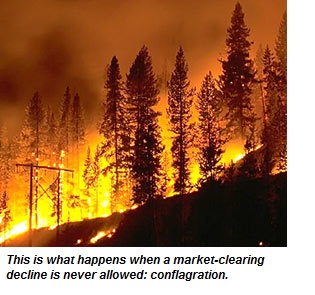The Financial Markets Now Control Everything
April 29, 2015
The entire economic and political structure is now dependent in one way or another on the continued expansion of financial markets.
The financial markets don't just dominate the economy--they now control everything. In 1999, the BBC broadcast a 4-part documentary by Adam Curtis, The Mayfair Set ( Episode 1: "Who Pays Wins" 58 minutes), that explored the way financial markets have come to dominate not just the economy but the political process and society.
In effect, politicians now look to the markets for policy guidance, and any market turbulence now causes governments to quickly amend their policies to "rescue" the all-important markets from instability.
This is a global trend that has gathered momentum since the program was broadcast in 1999, as The Global Financial Meltdown of 2008-09 greatly reinforced the dominance of markets.
It's not just banks that have become too big to fail; the markets themselves are now too influential and big to fail.
Curtis focuses considerable attention on the way in which seemingly "good" financial entities such as pension funds actively enabled the "bad" corporate raiders of the 1980s by purchasing the high-yield junk bonds the raiders used to finance their asset-stripping ventures.
This increasing dependence of "good" entities on players making risky bets and manipulating markets has created perverse incentives to keep the financial bubble-blowing going with government backstops and changing the rules to mask systemic leverage and risk.
The government must prop up markets, not just to insure the cash keeps flowing into political campaign coffers, but to save pension funds and the "wealth effect" that is now the sole driver of "growth" (expanding consumption) other than debt.
To maintain the illusion of growth and rising wealth, the financial markets must continually reach greater extremes: extremes of debt, leverage, obscurity and valuations. These extremes destabilize markets, first beneath the surface and then all too visibly.
The technological advances of the past decade have enabled a host of financial schemes that together have the potential to destabilize the markets globally. Technology enables high-frequency (HFT) traders to only suffer one losing day per year, complex reverse-repo swaps/trades, huge derivative bets and shadow banking, where all the risks generated by these activities can pool up outside the view and control of regulators.
The entire economic and political structure is now dependent in one way or another on the continued expansion of financial markets.
This spells the end of the electoral-political control of the economy, as politicians of all stripes quickly abandon all their ideologies and policies and rush to "save" the markets from any turmoil, because that turmoil could destabilize not just the financial markets but the economy, pensions and ultimately the government's ability to finance its own profligate borrowing and spending.
This dependence on the markets is pushing central banks and states into ever-more extreme policies, even as the risks of complex swaps and trades is rising beneath the surface.
A case can be made that the technologically-enabled complexity of the shadow-banking markets is now beyond the control of the state or central bank, which leads to a sobering conclusion: the next crisis will not be controllable, and destabilized markets will not be "saved" by tricks such as lowering interest rates to zero and increasing liquidity.
The structural problem with everyone and everything now depending on the speculative returns of the financial markets is there can never be any market clearing event that exposes phantom collateral and forces the liquidation of bad debt and excess credit.

I explain the danger of continually 'saving" the markets from any market clearing event in The Yellowstone Analogy and The Crisis of Neoliberal Capitalism (May 18, 2009).
When a forest is never allowed to burn away the accumulation of dead branches and underbrush with a limited fire, the forest eventually catches fire anyway. The deadwood (of bad debt, excessive credit and leverage and phantom collateral) is now piled so high, the entire forest burns down to ashes.
This is the eventual cost of never allowing any clearing of financial deadwood because everyone is now so dependent on financial markets that the slightest swoon will bring down the entire system. This vulnerability only increases with every "save" and every new bubble.
All the "saves" have done is guarantee the financial system will burn down in a conflagration ignited by a seemingly trivial spark somewhere in the vast global system of phantom collateral.
NOTE: Contributions/subscriptions are acknowledged in the order received. Your name and email remain confidential and will not be given to any other individual, company or agency.
|
Thank you, Larry H. ($50), for your splendidly generous contribution to this site-- I am greatly honored by your steadfast support and readership. |